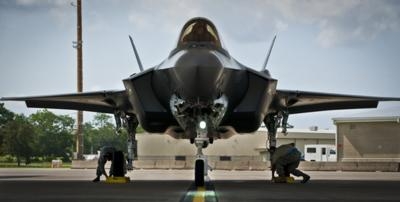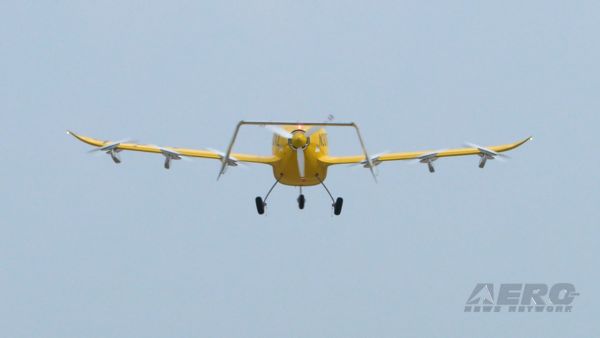Two Units Tasked With Keeping The Airplanes Flying
As the Air Force begins its Operational Utility Evaluation of the F-35A Lightning II, maintenance training to support the joint strike fighter is also preparing for key program milestones. Though the first "pipeline" students -- basic military training graduates -- don't begin training until January 2014, the two units in charge of F-35A maintenance training are already hard at work.

"We're working to set the conditions for success when pipeline training starts," said Maj. Kenneth Schneider, director of operations for the 359th Training Squadron at Eglin Air Force Base, FL. "That includes everything from updating the (Career Field Education and Training Plans) to achieving Community College of the Air Force accreditation."
Another key part of the preparation is acceptance testing the F-35 maintenance training devices, including electronic mediated lessons and interactive courseware. "We've completed instructor familiarization on all training system and course material that's been delivered so far and also validated the aircraft system maintenance training," said Schneider.
BMT graduates won't be on the 359th TRS' doorstep for more than a year, but training is already ongoing. Together with Field Training Detachment 19, 372nd Training Squadron, the 359th TRS is training experienced maintainers to work on the F-35A and serve as instructors. "Right now at Eglin, we're training fuels, low-observables, crew chiefs, avionics, egress and weapons maintainers," said Senior Master Sgt. Greg Elliott, Det. 19 detachment chief. "Our students are a mix of 33rd Fighter Wing maintainers as well as Airmen from Edwards AFB getting ready for (Operational Test and Evaluation) and from Hill AFB for depot maintenance. We're also training (Autonomic Logistics Information System) in 'purple' courses with Marines and Sailors."
The joint nature of training is not merely incidental, but part and parcel of F-35 maintenance training -- illustrated by the fact that both the 359th TRS and Det. 19 have Marine Corps officers in command. So far the maintenance training team has graduated 194 F-35 maintainers, performed more than 7,100 hours of course reviews and identified 9,970 line item curriculum corrections, Elliott said.

Pipeline F-35 maintenance students will begin technical training at the 82nd Training Wing at Sheppard AFB, Texas, which is the parent wing of both the 359th TRS and Det. 19. Though the two units are closely tied, they play very different roles in the maintenance training process. "The 359th will focus on initial skills training -- mostly for non-prior service students just graduating from BMT, which is what most people think of when they think of technical training," said Schneider. "There are two aspects to that. First, of course, is providing the technical skills these Airmen will need to be successful on the job. The second part is just as important, though, and that is to build on the foundation laid at BMT and instill Air Force values and culture into these young men and women." Meanwhile, Det. 19 will provide transition training for maintainers experienced on other airframes who are assigned to an F-35 unit. The detachment will also provide advanced maintenance courses.
One of 46 field training detachments the Air Force operates worldwide, Det. 19 is also working with the Navy and Marine Corps to establish best practices for F-35 training and maximize the use of limited training resources among the services. Earlier this year, the Marine Corps established its first field training detachment, mirroring the Air Force's model. "(The Marine Corps) decided that the Air Force model for maintenance training was the right way to do business," said Marine Capt. John Park, commander of Det. 19. "The Marine Corps, when we go to a platform, we stay there for our whole careers ... so this is new to us. Having Marines move to the F-35 from the F-18 Hornet or AV-8B Harrier is unheard of, so it's a big change in our training process."
The F-35 maintainers produced by the 359th TRS and Det. 19 will be among the 75,000 graduates delivered by the 82nd Training Wing each year, supporting every facet of aircraft maintenance as well as the civil engineering, telecommunications, logistics and security forces career fields.
(Photos provided by the USAF)
 Senator Pushes FAA to Accelerate Rocket Launch Licensing
Senator Pushes FAA to Accelerate Rocket Launch Licensing Classic Aero-TV: RJ Gritter - Part of Aviations Bright New Future
Classic Aero-TV: RJ Gritter - Part of Aviations Bright New Future Aero-FAQ: Dave Juwel's Aviation Marketing Stories -- ITBOA BNITBOB
Aero-FAQ: Dave Juwel's Aviation Marketing Stories -- ITBOA BNITBOB ANN's Daily Aero-Linx (10.27.24)
ANN's Daily Aero-Linx (10.27.24) ANN's Daily Aero-Term (10.27.24): Clearance Void If Not Off By (Time)
ANN's Daily Aero-Term (10.27.24): Clearance Void If Not Off By (Time)




